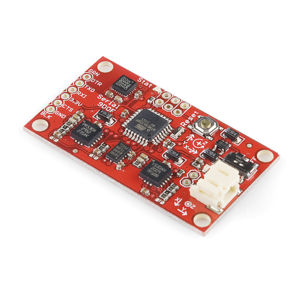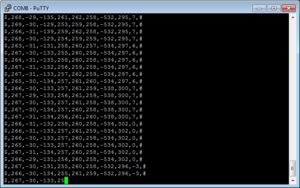Difference between revisions of "Trajectory from gyro/accellerometer/compas with 9DOF IMU (Michal Zemko, Peter Svitok)"
From RoboWiki
(→2. etapa) |
(→Zdrojový kód pre pohyb) |
||
| Line 30: | Line 30: | ||
Program je naprogramovaný v Jave | Program je naprogramovaný v Jave | ||
| − | == Zdrojový kód | + | == Zdrojový kód== |
'''Vykreslovanie''' | '''Vykreslovanie''' | ||
Revision as of 17:13, 28 June 2013
Zadanie
Trajectory from gyro/accellerometer/compas. Requirement: must use this part: 9DOF IMU
O súčiastke
V projekte sme mali využiť súčiastku 9DOF IMU a následne zo získaných dát vykresliť prejdenú trajektóriu robota.
Na doske 9DOF IMU sa nachádzajú nasledujúce komponenty:
Etapy
- 1. Oboznamánie sa s projektom
- 2. Naprogramovanie v Jave
- 3. Záverečné prípravy
1. etapa
V prvej etape sme dostali súčiastku a cez program Putty skúšali jej funkčnosť.
2. etapa
Program je naprogramovaný v Jave
Zdrojový kód
Vykreslovanie
static JFrame frame = new JFrame("Points");
public class pokus extends JPanel{
public void paintComponent(Graphics g) {
//super.paintComponent(g);
Graphics2D g2d = (Graphics2D) g;
g2d.setColor(Color.black);
Dimension size = getSize();
Insets insets = getInsets();
int w = size.width - insets.left - insets.right;
int h = size.height - insets.top - insets.bottom;
Random r = new Random();
// int x = Math.abs(r.nextInt()) % w;
// int y = Math.abs(r.nextInt()) % h;
int x = data_new[0]-data_old[0];
int y = data_new[1]-data_old[1];
startx+=x;
starty+=y;
x=startx;
y=starty;
int x2 = 0;
int y2 = 0;
if(((x>0)&&(x<800))&&((y>0)&&(y<600))){
array.add(x);
array.add(y);
for(int i=0;i<array.size();i+=2){
x=array.get(i).intValue();
y=array.get(i+1).intValue();
if(i>1){
x2=array.get(i-2).intValue();
y2=array.get(i-1).intValue();
g2d.drawLine(x, y, x2, y2);
}
g2d.drawLine(x, y, x, y);
g2d.drawLine(x+1, y, x-1, y);
g2d.drawLine(x, y+1, x, y-1);
}
}
}
}

